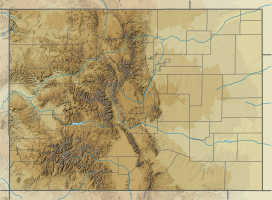Milwaukee Peak is a 13,522-foot (4,122 m) mountain summit in Saguache County, Colorado, United States.
| Milwaukee Peak | |
|---|---|
 East aspect, centered at top (Crestone Needle at upper right) | |
| Highest point | |
| Elevation | 13,522 ft (4,122 m)[1][2] |
| Prominence | 297 ft (91 m)[3] |
| Parent peak | Pico Aislado (13,611 ft)[3] |
| Isolation | 0.47 mi (0.76 km)[3] |
| Coordinates | 37°56′52″N 105°33′05″W / 37.9477379°N 105.5513657°W[4] |
| Geography | |
| Country | United States |
| State | Colorado |
| County | Saguache |
| Protected area | Sangre de Cristo Wilderness Great Sand Dunes Preserve |
| Parent range | Rocky Mountains Sangre de Cristo Range[2] |
| Topo map | USGS Crestone Peak |
| Geology | |
| Mountain type | Fault block |
| Climbing | |
| Easiest route | class 4 scrambling[5] |
Description
editMilwaukee Peak is set on the crest of the Sangre de Cristo Range which is a subrange of the Rocky Mountains.[2] The mountain is located on the boundary shared by Sangre de Cristo Wilderness and Great Sand Dunes National Park and Preserve.[2] Precipitation runoff from the mountain's eastern slope drains into headwaters of Sand Creek, the west slope drains into Cottonwood and Deadman creeks, and all three flow into the San Luis Valley. Topographic relief is significant as the summit rises 1,777 feet (542 m) above Upper Sand Creek Lake in 0.75 mile (1.2 km). The mountain's toponym has been officially adopted by the United States Board on Geographic Names.[4]
Climate
editAccording to the Köppen climate classification system, Milwaukee Peak has an alpine climate with cold, snowy winters, and cool to warm summers.[6] Due to its altitude, it receives precipitation all year, as snow in winter and as thunderstorms in summer, with a dry period in late spring. Climbers can expect afternoon rain, hail, and lightning from the seasonal monsoon in late July and August.
See also
editReferences
edit- ^ Robert M. Ormes (2000), Guide to the Colorado Mountains, Colorado Mountain Club Press, ISBN 9780967146607, p. 109.
- ^ a b c d "Milwaukee Peak, Colorado". Peakbagger.com. Retrieved May 29, 2023.
- ^ a b c "Milwaukee Peak – 13,526' CO". listsofjohn.com. Retrieved May 29, 2023.
- ^ a b "Milwaukee Peak". Geographic Names Information System. United States Geological Survey, United States Department of the Interior. Retrieved May 29, 2023.
- ^ James Dziezynski (2012), Best Summit Hikes in Colorado, AdventureKEEN, ISBN 9780899977126, p. 324.
- ^ Peel, M. C.; Finlayson, B. L.; McMahon, T. A. (2007). "Updated world map of the Köppen−Geiger climate classification". Hydrol. Earth Syst. Sci. 11. ISSN 1027-5606.
External links
edit- Milwaukee Peak: weather forecast

